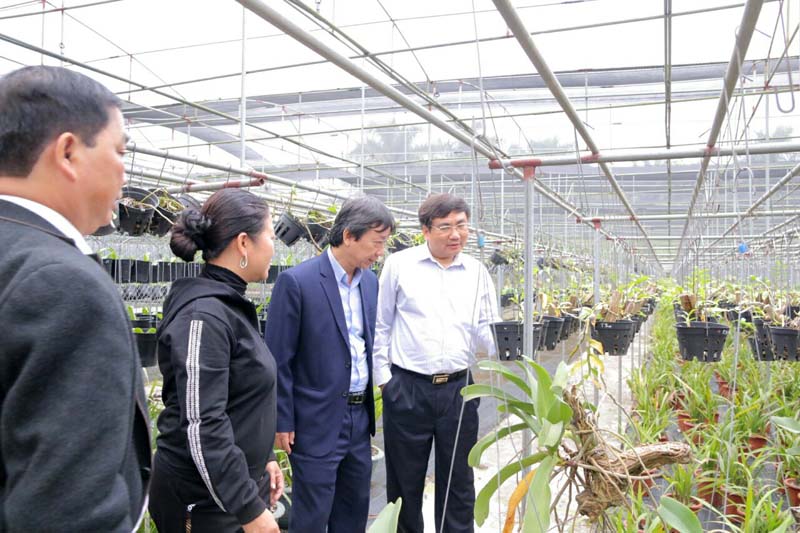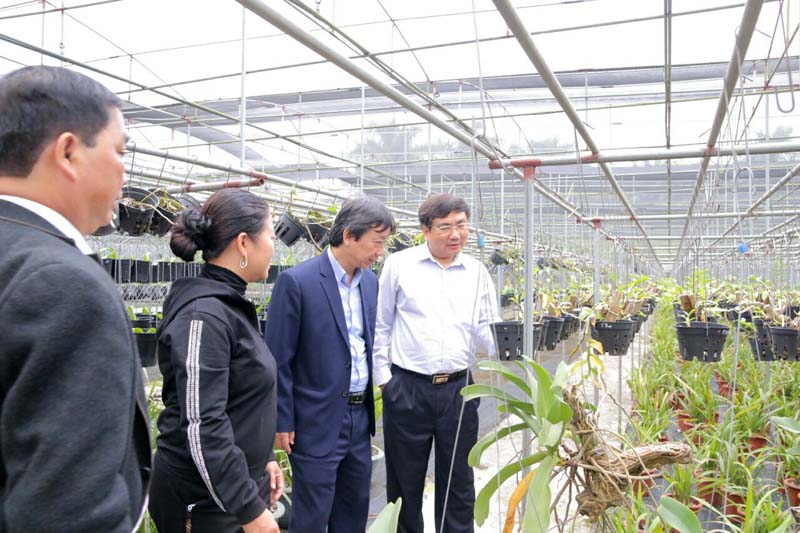
(HBO) – A delegation of Hoa Binh province on November 21 made a working trip to Luong Son district to assess the district’s performance in implementing criteria for new-style rural area in 2019.

The delegation
visits an orchid growing model in Nhuan Trach commune, Luong Son district.
After
the ten-year implementation of the new-style rural area building programme, all
19 communes in Luong Son have been recognised as new-style rural areas. The
district has invested in infrastructure to better serve local socio-economic
development and residents’ daily life.
Luong
Son has also paid attention to restructuring the agricultural sector and
improving the material and spiritual life of locals. The
locality’s poverty rate is expected to drop to 3.41 percent by the end of this
year, and per capita income to reach 38 million VND.
According
to the People’s Committee of the district, Luong Son has met all nine criteria
set for a new-style rural district. After
touring some communes, the delegation had a working session with the district’s
People’s Committee to evaluate the implementation of the national target
programme on new-style rural area building in the locality.
They
agreed with the committee’s assessment and suggested it supplement relevant
documents, review data in the dossier and attached documents, and send the dossier
to competent agencies on November 25 to submit it to the provincial People’s
Committee for voting.
At
the working session, Luong Son’s leaders pledged to instruct relevant agencies
to soon complete the dossier while continuing with the building of new-style
rural areas, focusing on improving the quality of all criteria./.
According to data from the Hoa Binh Provincial Party Committee, the industrial production index for the first six months of 2025 is estimated to have increased by 20% compared to the same period last year. This marks the highest year-on-year growth rate for this period since 2020.
In the first six months of 2025, Hoa Binh province’s export turnover was estimated at 1.145 billion USD, marking an 18.11% increase compared to the same period in 2024. Import turnover was estimated at $ 804 million, a 17.15% increase, which helped the province maintain a positive trade balance.
The lives of the ethnic minority farmers in Tan Lac district have gradually improved thanks to the new directions in agricultural production. This is a testament to the collective strength fostered through the professional associations and groups implemented by various levels of the district’s Farmers’ Union.
With the motto the "product quality comes first,” after nearly one year of establishment and operation, Muong village’s Clean Food Agricultural and Commercial Cooperative, located in Cau Hamlet, Hung Son Commune (Kim Boi district), has launched reputable, high-quality agricultural products to the market that are well-received by consumers. The products such as Muong village’s pork sausage, salt-cured chicken, and salt-cured pork hocks have gradually carved out a place in the market and they are on the path to obtaining the OCOP certification.
In the past, the phrase "bumper harvest, rock-bottom prices" was a familiar refrain for Vietnamese farmers engaged in fragmented, small-scale agriculture. But today, a new spirit is emerging across rural areas of Hoa Binh province - one of collaboration, organisation, and collective economic models that provide a stable foundation for production.
Maintaining growing area codes and packing facility codes in accordance with regulations is a mandatory requirement for agricultural products to be eligible for export. Recently, the Department of Agriculture and Environment of Hoa Binh province has intensified technical supervision of designated farming areas and packing facilities to safeguard the "green passport" that enables its products to access international markets.



